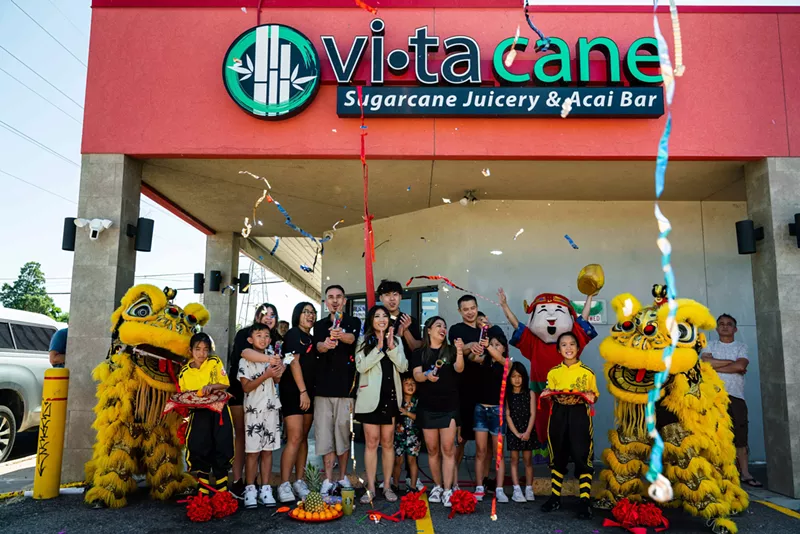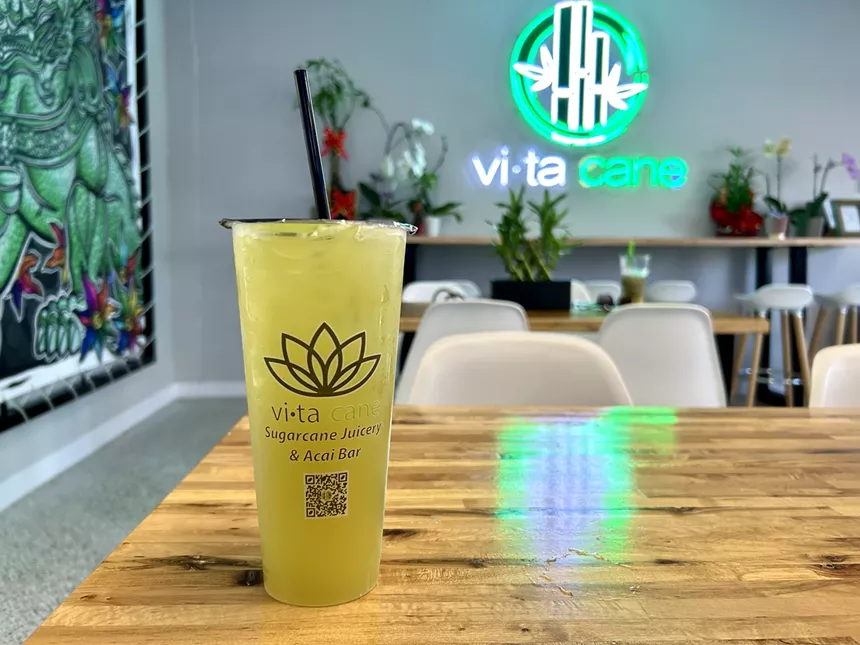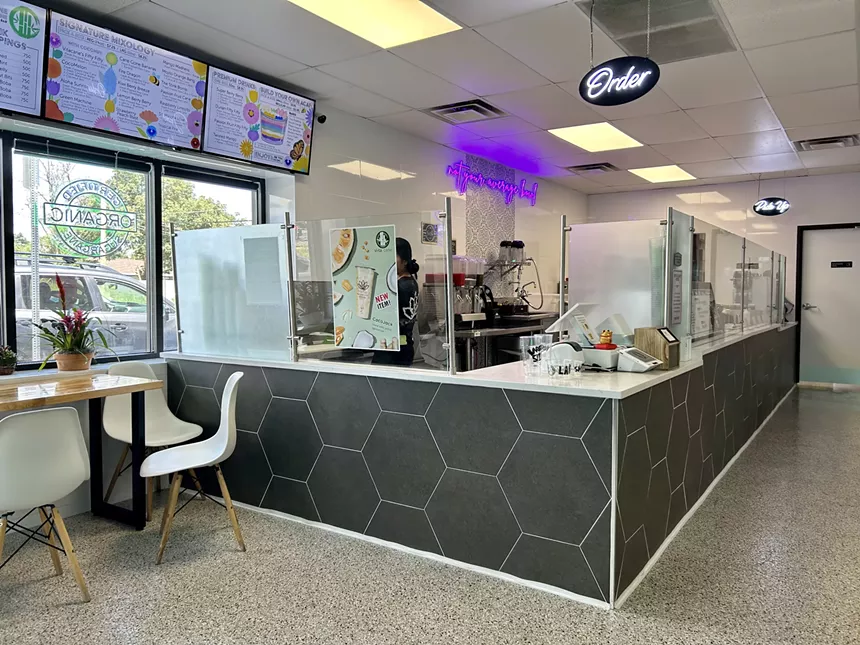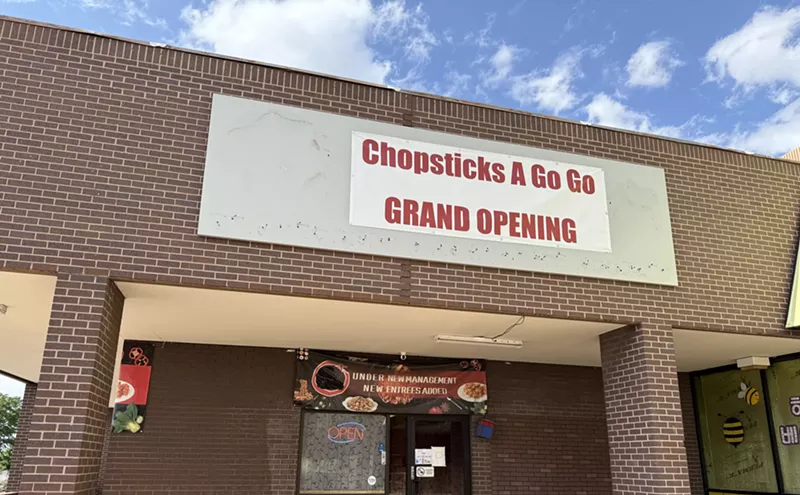“It's sugarcane in its rawest, purest form,” says Linh Ton, co-owner of Colorado’s first Vita Cane location. She and Le-An Than, along with their husbands, opened the organic sugarcane juicery and açaí bar at 1000 South Federal Boulevard, in a corner of a busy strip mall within the Little Saigon district, in July.
Sugarcane juice isn’t new to the area. “We've been drinking sugarcane forever. Our really good friends down at New Saigon Bakery offer a sugarcane drink. We were getting it there for decades before,” explains Ton. But, she notes, “We're the first brick-and-mortar shop [in Colorado] that specializes, specifically, in sugarcane.”
“We don't have boba, we don't have smoothies — we don't have any of that," Than adds, "so we had to keep it very authentic. We had to make sure that the community would support it, so we couldn't just open in any location.”
Many customers are of Asian and Latin descent, given those cultures' familiarity with sugarcane juice, and they’ve shared reactions such as, “'This reminds me of Singapore. This reminds me of Vietnam. This reminds me of my childhood,'” says Than. “It’s a lot of nostalgia.”
Sugarcane juice isn’t new to the area. “We've been drinking sugarcane forever. Our really good friends down at New Saigon Bakery offer a sugarcane drink. We were getting it there for decades before,” explains Ton. But, she notes, “We're the first brick-and-mortar shop [in Colorado] that specializes, specifically, in sugarcane.”
“We don't have boba, we don't have smoothies — we don't have any of that," Than adds, "so we had to keep it very authentic. We had to make sure that the community would support it, so we couldn't just open in any location.”
Many customers are of Asian and Latin descent, given those cultures' familiarity with sugarcane juice, and they’ve shared reactions such as, “'This reminds me of Singapore. This reminds me of Vietnam. This reminds me of my childhood,'” says Than. “It’s a lot of nostalgia.”
Ton affirms this, saying that the nostalgic sentiment often comes from older Vietnamese patrons. “They're like, ‘This tastes like Vietnam — 100 percent.'” She adds that they often order sugarcane juice with kumquat, a traditional blend that balances sweet and tart flavors.
“A lot of places will have sugarcane with kumquat only, especially Vietnamese stores that sell out of their restaurants. It's only one type of sugarcane drink. We have other options,” says Than, mentioning that top sellers include the 50/50, which is blended with coconut juice, and the Coco Melon Cane, with coconut juice and watermelon.
Other fruit juice infusions include tropical flavors like mango, passion fruit and pineapple, as well as a variety of berries. There are also uncommon takes, like the Baja Stink Bomb, which combines sugarcane juice with avocado and durian, as well as the Green Machine, made with pennywort, a tonic herb native to Asian and other tropical regions.
Vita Cane juices its pennywort leaves and other fruits, including coconuts, in-house. “There's nothing that's processed about any of our drinks," Than says. "There's no syrup. There are no additives. It's pure.”
When first-time customers who are unfamiliar with sugarcane juice visit, Than says she helps guide them by asking, "'Do you want citrusy or would you like sweet?'" Or, "'What type of fruits do you like?' Because the sugar cane just enhances that fruit flavor."
Sugarcane juice has long served a niche audience, but businesses like Vita Cane and Lucky Canes are popularizing it in Denver. I hadn’t tried the beverage prior to meeting Ton and Than. The popular 50/50 beverage infused with coconut had a flavor reminiscent of honeydew or aloe vera juice, and its sweetness wasn't syrupy; instead, it had a natural quality.
I also sampled sugarcane juice infused with kumquat and was pleasantly surprised by its balance of flavors. It was tart and citrusy, but not sour enough to make you pucker. Note to novices: To properly mix the flavors, be sure to shake the beverage before sticking a straw through its sealed lid.
“A lot of places will have sugarcane with kumquat only, especially Vietnamese stores that sell out of their restaurants. It's only one type of sugarcane drink. We have other options,” says Than, mentioning that top sellers include the 50/50, which is blended with coconut juice, and the Coco Melon Cane, with coconut juice and watermelon.
Other fruit juice infusions include tropical flavors like mango, passion fruit and pineapple, as well as a variety of berries. There are also uncommon takes, like the Baja Stink Bomb, which combines sugarcane juice with avocado and durian, as well as the Green Machine, made with pennywort, a tonic herb native to Asian and other tropical regions.
Vita Cane juices its pennywort leaves and other fruits, including coconuts, in-house. “There's nothing that's processed about any of our drinks," Than says. "There's no syrup. There are no additives. It's pure.”
When first-time customers who are unfamiliar with sugarcane juice visit, Than says she helps guide them by asking, "'Do you want citrusy or would you like sweet?'" Or, "'What type of fruits do you like?' Because the sugar cane just enhances that fruit flavor."
Sugarcane juice has long served a niche audience, but businesses like Vita Cane and Lucky Canes are popularizing it in Denver. I hadn’t tried the beverage prior to meeting Ton and Than. The popular 50/50 beverage infused with coconut had a flavor reminiscent of honeydew or aloe vera juice, and its sweetness wasn't syrupy; instead, it had a natural quality.
I also sampled sugarcane juice infused with kumquat and was pleasantly surprised by its balance of flavors. It was tart and citrusy, but not sour enough to make you pucker. Note to novices: To properly mix the flavors, be sure to shake the beverage before sticking a straw through its sealed lid.
“We really stand behind the product because it's done right,” says Ton, who visited several Vita Cane shops in California with her husband before signing on as franchisees. The trip solidified their interest in the opportunity, as each location impressed with its quality and consistency. “The biggest thing for my husband was to be able to stand behind it and know what it's all about. His parents owned a restaurant for, like, thirty years, so he comes from that background.”
In addition, Ton and her spouse previously owned a different franchise food business. Their operations experience married well with Than and her husband’s background in construction and commercial properties. When the partners found the South Federal space last May, it was a blank canvas.
“We put all of our work into it. We didn't hire out for much — just what required licensing. [We and] our husbands were very involved in the buildout of this location,” says Than.
“We really thank the community for the outpouring love and support, because it's been one heck of a ride," Ton concludes. "It's been so fun, and we feel truly feel blessed.”
In addition, Ton and her spouse previously owned a different franchise food business. Their operations experience married well with Than and her husband’s background in construction and commercial properties. When the partners found the South Federal space last May, it was a blank canvas.
“We put all of our work into it. We didn't hire out for much — just what required licensing. [We and] our husbands were very involved in the buildout of this location,” says Than.
“We really thank the community for the outpouring love and support, because it's been one heck of a ride," Ton concludes. "It's been so fun, and we feel truly feel blessed.”















